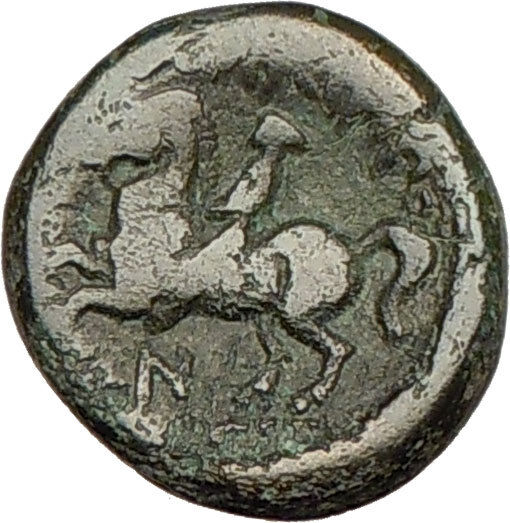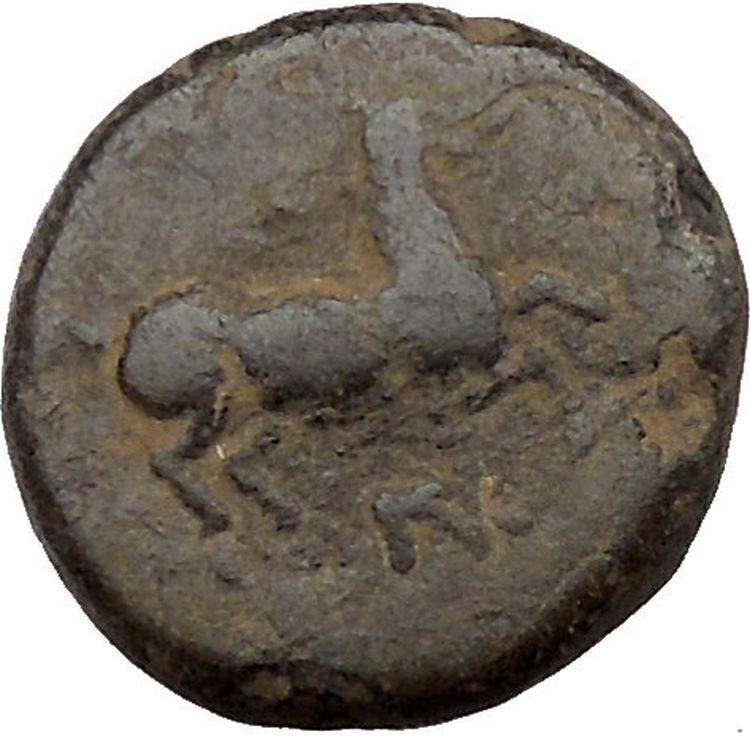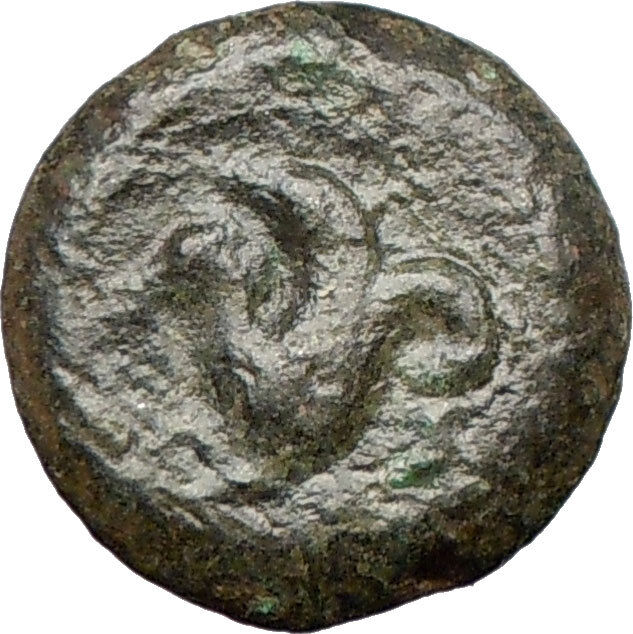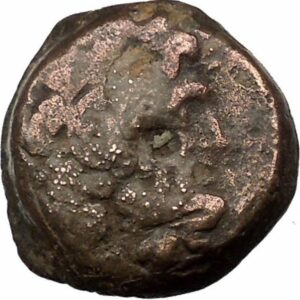|
Greek city of Tegea in Arkadia
Bronze Trichalkon 16mm (3.25 grams) Struck circa
240-167 B.C.
Reference: HGC 5, 1066 | Pedigree: Ex BCD Collection
Wreathed head of Eileithuia to left, with lit torch over
shoulder.
TEΓEA, Athena standing
right, placing lock of Medusa’s hair into jar held by
Aerope, standing left; magistrate’s name to right.
In a myth
of the city, Tegea’s king, Kepheos gave his 20 sons to
help Hercules in a war against Sparta. Hercules, being
grateful for this help gave a lock of hair from Medusa’s
head Kepheos’ daughter, Aerope (also called Sterope) to
help protect the city in their absence.
In the south-east of Arkadia,
Tegea was an important city of very early foundation. It possessed a magnificent
temple of Athena Alea, by the architect Skopas.
You
are bidding on the exact item pictured, provided with a
Certificate of Authenticity and Lifetime Guarantee of
Authenticity.
Eileithyia or Ilithyia was the
Greek goddess
of
childbirth
and
midwifery
.
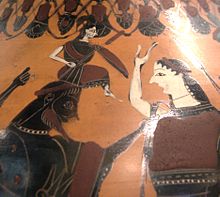
The birth of
Athena
from the
head of
Zeus
, with
Eileithyia on the right.
Etymology
According to some authors, her name does not have an
Indo-European
etymology, which for R. F. Willets strengthens her link
to Minoan culture. “The links between Eileithyia, an
earlier Minoan goddess, and a still earlier
Neolithic
prototype
are, relatively, firm,” he wrote. “The continuity of her
cult depends upon the unchanging concept of her
function. Eileithyia was the goddess of childbirth; and
the divine helper of women in labour has an obvious
origin in the human midwife.” Additionally, for Willets,
Cretan dialect ‘Eleuthia’ would connect Eileithyia (or
perhaps the goddess “Eleutheria“)
to
Eleusis
.
19th-century scholars suggested that the name is
Greek, from the verb eleutho (ἐλεύθω), “to
bring,” the goddess thus being The Bringer. The
variants Eleuthia (Cretan) and Eleuthō
(used by
Pindar
) suggest a
possible connection with “Eleutheria”
(freedom). The earliest form of the name is the
Mycenaean Greek
,
e-re-u-ti-ja, written in the
Linear B
syllabic
script. Ilithyia is the
latinisation
of
Εἰλείθυια.
Origins
To
Homer
, she is “the
goddess of childbirth”. The
Iliad
pictures
Eileithyia alone, or sometimes multiplied, as the
Eileithyiai:
- And even as when the sharp dart striketh a
woman in travail, [270] the piercing dart that the
Eilithyiae, the goddesses of childbirth, send—even
the daughters of Hera that have in their keeping
bitter pangs;
- —Iliad 11.269–272
Hesiod
(c. 700 BC)
described Eileithyia as a daughter of Hera by
Zeus
(Theogony
921)—and the
Bibliotheca
(Roman-era) and
Diodorus Siculus
(c. 90–27 BC) (5.72.5) agreed. But
Pausanias
, writing in
the 2nd century AD, reported another early source (now
lost): “The
Lycian
Olen
, an earlier poet,
who composed for the
Delians
, among other
hymns, one to Eileithyia, styles her ‘the
clever spinner‘, clearly identifying her with
Fate
, and makes
her older than
Cronus
.” Being the
youngest born to
Gaia
, Cronus was a
Titan of the first generation and he was identified as
the father of Zeus. Likewise, the meticulously accurate
mythographer
Pindar
(522–443 BC)
also makes no mention of Zeus:
- Goddess of childbirth, Eileithyia, maid to
the throne of the deep-thinking
Moirai
, child of
all-powerful
Hera
, hear my song.
- —Seventh Nemean Ode.
Later, for the Classical Greeks, “She is closely
associated with
Artemis
and
Hera
,” Burkert asserts
(1985, p 1761), “but develops no character of her own”.
In the
Orphic Hymn
to
Prothyraeia, the association of a goddess of childbirth
as an epithet of virginal Artemis, making the
death-dealing huntress also “she who comes to the aid of
women in childbirth,” (Graves 1955 15.a.1), would be
inexplicable in purely Olympian terms:
- When racked with labour pangs, and sore
distressed
- the sex invoke thee, as the soul’s sure rest;
- for thou Eileithyia alone canst give relief
to pain,
- which art attempts to ease, but tries in
vain.
- Artemis Eileithyia, venerable power,
- who bringest relief in labour’s dreadful
hour.
- —Orphic Hymn 2, to Prothyraeia, as translated by
Thomas Taylor
,
1792.
Thus
Aelian
in the 3rd
century AD could refer to “Artemis of the child-bed” (On
Animals 7.15).
The Beauty of Durrës
, a
large 4th-century BC mosaic showing the head figure of a
woman, probably portrays the goddess Eileithyia.[11]
Vase-painters, when illustrating the birth of
Athena
from Zeus’ head,
may show two assisting Eileithyiai, with their hands
raised in the
epiphany
gesture.
Cult
at Amnisos
The
cave of Eileithyia
near
Amnisos
, the harbor of
Knossos
, mentioned in
the
Odyssey
(xix.198)
in connection with her cult, was accounted the
birthplace of Eileithyia. The Cretan cave has
stalactites suggestive of the goddess’ double form (Kerenyi
1976 fig. 6), of bringing labor on and of delaying it,
and votive offerings to her have been found establishing
the continuity of her cult from Neolithic times, with a
revival as late as the Roman period. Here she was
probably being worshipped before Zeus arrived in the
Aegean, but certainly in Minoan–Mycenaean times (Burkert
1985 p 171; Nilsson 1950:53). The goddess is mentioned
as Eleuthia in a
Linear B
fragment from
Knossos. In classical times, there were shrines to
Eileithyia in the Cretan cities of
Lato
and
Eleutherna
and a sacred
cave at
Inatos
.
On the Greek mainland, at
Olympia
, an archaic
shrine with an inner
cella
sacred to the
serpent-savior of the city (Sosipolis) and to
Eileithyia was seen by the traveller Pausanias in the
2nd century AD (Greece vi.20.1–3); in it, a
virgin-priestess cared for a
serpent
that was “fed”
on honeyed barley-cakes and water—an offering suited to
Demeter. The shrine memorialized the appearance of a
crone with a babe in arms, at a crucial moment when
Elians
were threatened
by forces from
Arcadia
. The child,
placed on the ground between the contending forces,
changed into a serpent, driving the Arcadians away in
flight, before it disappeared into the hill.
There were ancient icons of Eileithyia at Athens, one
said to have been brought from Crete, according to
Pausanias, who mentioned shrines to Eileithyia in
Tegea
and
Argos
, with an
extremely important shrine in
Aigion
. Eileithyia,
along with Artemis and
Persephone
, is often
shown carrying torches to bring children out of darkness
and into light: in
Roman mythology
her
counterpart in easing labor is
Lucina
(“of the
light”).
In Greek shrines, small terracotta votive figures (kourotrophos)
depicted an immortal nurse who took care of divine
infants, who may be connected with Eileithyia. According
to the
Homeric Hymn
III to
Delian Apollo, Hera detained Eileithyia, who was coming
from the
Hyperboreans
in the far
north, to prevent
Leto
from going into
labor with Artemis and Apollo, because the father was
Zeus. Hera was very jealous of Zeus’s relations with
others and went out of her way to make the women suffer.
The other goddesses present at the birthing on Delos
sent
Iris
to bring her. As
she stepped upon the island, the birth began.
Eileithyia was especially worshipped in Crete, in the
cities Lato and doubtless, from its etymological link,
Eleutherna[citation
needed], though no
archaeological find has identified her there. Caves were
sacred to her: the inescapable association to the birth
canal cannot be proved beyond a skeptic’s doubt. Her
Egyptian counterpart is
Tawaret
./a>.

Athena
or Athene (Latin:
Minerva
),
also referred to as Pallas Athena, is the goddess
of war, civilization, wisdom, strength, strategy,
crafts, justice and skill in
Greek mythology
.
Minerva
,
Athena’s Roman incarnation, embodies similar attributes.
Athena is also a shrewd companion of
heroes
and the
goddess
of
heroic
endeavour. She is the
virgin
patron of
Athens
.
The Athenians built the
Parthenon
on the Acropolis of her namesake city, Athens, in her
honour (Athena Parthenos). Athena’s cult as the patron
of Athens seems to have existed from the earliest times
and was so persistent that archaic myths about her were
recast to adapt to cultural changes. In her role as a
protector of the city (polis),
many people throughout the Greek world worshiped Athena
as Athena Polias (“Athena of the city”).
Athens
and Athena bear etymologically connected names.
Alea (Greek:
Ἀλέα) was an
epithet
of the
Greek goddess
Athena
, prominent in
Arcadian
mythology, under which she was
worshiped at
Alea
,
Mantineia
and
Tegea
. Alea was initially an independent
goddess, but was eventually assimilated with Athena.
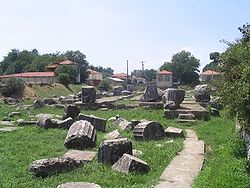
(left) The temple of Athena Alea at Tegea
The temple of Athena Alea at
Tegea
, which was the oldest, was said to have
been built by Aleus
the son of
Apheidas
, from whom the goddess probably
derived this epithet. This temple was burned down in
394 BC
, and a new one built by the architect
Scopas
, a temple of the
Doric order
which in size and splendor
surpassed all other temples in the
Peloponnese
, and was surrounded by a triple row
of columns
of different
orders
. The statue of the goddess, which was
made by Endoeus
all of ivory, was subsequently carried
to Rome
by
Augustus
to adorn the
Forum of Augustus
. The temple of Athena Alea at
Tegea was an ancient and revered asylum, and the names of many persons are
recorded who saved themselves by seeking refuge in it.
The priestess of Athena Alea at Tegea was always a
maiden
, who held her office only until she
reached the age of
puberty
.
On the road from Sparta to Therapne there was likewise a statue of Athena
Alea.
Tegea was a settlement in ancient Greece, and it is also
a municipality in modern
Arcadia
,
Greece
, with its seat in the village
Stadio
.
Coordinates
 37°27.3′N 37°27.3′N
22°25.2′E
Ancient
Tegea was an important religious center of ancient Greece, containing the Temple
of Athena Alea
. The temenos was founded by
Aleus
,
Pausanias
was informed. Votive bronzes at the
site from the Geometric and Archaic periods take the forms of horses and deer;
there are
sealstones
and
fibulae
. In the Archaic period the nine
villages that underlie Tegea banded together in a
synoecism
to form one city. Tegea was listed in
Homer
‘s
Catalogue of Ships
as one of the cities that
contributed ships and men for the
Achaean assault on Troy
.
Tegea struggled against Spartan
hegemony
in
Arcadia
and was finally conquered ca 560 BCE.
In the fourth century Tegea joined the
Arcadian League
and struggled to free itself
from Sparta
. The
Temple of Athena Alea
burned in
394 BC
and was magnificently rebuilt, to
designs by Scopas
of Paros, with reliefs of the
Calydonian boar
hunt in the main pediment.The
city retained civic life under the
Roman Empire
; it was sacked in 395 by the
Goths
.
Pausanias
visited the city in the second
century
CE
. The “tombs” he saw there were shrines to
the chthonic
founding daemones: “There are
also tombs of
Tegeates
, the son of
Lykaon
, and of
Maira
, the wife of Tegeates. They say Maira was
a daughter of
Atlas
, and Homer makes mention of her in the
passage where Odysseus
tells to
Alkinous
his journey to
Hades
, and of those whose ghosts he beheld
there.”
In the Middle Ages
, the town was known as Nikli
(Νίκλι) and the seat of a
barony
of the
Principality of Achaea
.
The site of ancient Tegea is now located within the modern town of
Alea
, which was referred to as
Piali
(not to be confused with
Palaia Episkopi
). Alea is located about 10
kilometers southeast of
Tripoli
. The municipality of Tegea has its seat
at
Stadio
. The
province of Megalopoli
is bordered to the west
and the
province of Kynouria
is bordered to the east.

Arcadia
Geographically, ancient Arcadia occupied the
highlands at the centre of the Peloponnese. To the
north, it bordered
Achaea
along the ridge
of high ground running from Mount Erymanthos to Mount
Cyllene; most of
Mount Aroania
lay
within Arcadia. To the east, it had borders with
Argolis
and
Corinthia
along the
ridge of high ground running from Mount Cyllene round to
Mount Oligyrtus
and
then south
Mount Parthenius
. To
the south, the border
Laconia
and
Messenia
ran through
the foothills of the
Parnon
and
Taygetos
mountain
ranges, such that Arcadia contained all the headwaters
of the
Alpheios
river, but
none of the
Eurotas
river. To the
south-west, the border with Messania ran along the tops
of
Mount Nomia
, and
Mount Elaeum
, and from
there the border with
Elis
ran along the
valleys of the
Erymanthos
and
Diagon
rivers. Most of
the region of Arcardia was mountainous, apart from the
plains around
Tegea
and
Megalopolis
, and the
valleys of the Alpheios and
Ladon
rivers.
Due to its remote, mountainous character, Arcadia
seems to have been a cultural refuge. When, during the
Greek Dark Age
,
Doric Greek
dialects
were introduced to the Peloponnese, the older language
apparently survived in Arcadia, and formed part of the
Arcado-Cypriot
group of
Greek languages. Herodotus says that the inhabitants of
Arcadia were
Pelasgians
, the Greek
name for the supposed ‘indigenous’ inhabitants of
Greece, who dwelt there before the arrival of the
‘Hellenic’ tribes. Whilst Herodotus seems to have found
the idea that the Pelasgians were not ‘Greek’
far-fetched, it is clear that the Arcadians were
considered as the original inhabitants of the region.
Arcadia is one of the regions described in the “catalogue
of ships” in the
Iliad
.
Agamemnon
himself gave
Arcadia the ships for the Trojan war because Arcadia did
not have a navy.
There is a modern regional unit of Greece of the
same name
, which is
more extensive than the ancient region.
|











